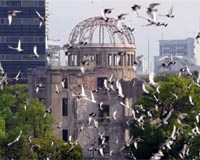 |
Hiroshima, Japan (AFP) Aug 4, 2010 Three days after an atomic bomb devastated Hiroshima, six-year-old Kazuko Uragashira and her parents were aboard an evacuation train out of their charred home city. Having narrowly survived the nuclear inferno, the family headed for the home of an uncle, not knowing that another date with destiny lay ahead of them. His home town was Nagasaki. Uragashira remembers sitting on the train, her legs burnt from the radioactive blast, when their train stopped in a tunnel outside Nagasaki after a 300-kilometre (190-mile) journey. "It was another scene from hell," Uragashira, now 71, recalled. They had stumbled into the immediate aftermath of the second atomic bombing in Japan, on August 9, 1945. As the train passengers painstakingly trudged their way through the carnage, she saw survivors with molten skin dripping off their bodies. "I still remember the smell of charred bodies and the weak screams of the dying, for water... Even if I suffer dementia, I will never forget it," she said. Uragashira, who now lives on a remote island off Nagasaki, is one of the few remaining "niju hibakusha" -- survivors of not one but both US atom bomb attacks on Japan in the final days of World War II. "I was lucky as a lot of others died instantly, but I still want to know why such a horrible thing happened to me twice," she said quietly. An estimated 140,000 people died instantly in Hiroshima or succumbed to burns and radiation sickness soon after the blast, and over 70,000 perished as a result of the Nagasaki attack three days later. Friday marks the 65th anniversary of the Hiroshima bombing. For the first time, the United States will send an envoy to a ceremony held each year to remember the bombing, reflecting US President Barack Obama's push for global nuclear disarmament, a campaign long pioneered by Japan. The US ambassador will be joined by diplomats from Britain and France, while Ban Ki-moon will become the first UN chief to attend the annual event at the Hiroshima Peace Memorial. Many in Japan hope Obama will visit Hiroshima later this year. Friday's ceremony will also commemorate the thousands who survived the blasts but spent their lives living with its after-effects, with many suffering leukaemia and other cancers. Around 150 people, like Uragashira, are thought to have been exposed to both bombings. The only person officially recognised as a survivor of both bombs, Tsutomu Yamaguchi, who died in January aged 93, once told an interviewer: "I thought the mushroom cloud had followed me." Media interest has grown in the double-survivors. Last month, a publisher released the Japanese translation of interviews a New York Times correspondent held with nine of them in the 1950s. Film director Hidetaka Inazuka has recorded testimonies by double bomb survivors to keep alive their memories. While many Americans believe the bombs were necessary to bring a speedy end to the war, Inazuka, like many Japanese, argues the attacks -- at least the one on Nagasaki -- were unwarranted because Japan was on the verge of surrender. "Hiroshima was completely destroyed, which should have been sufficient," Inazuka said. "We need to strictly verify why they were dropped on the two cities." Inazuka said the clock is now ticking to record the voices of the survivors, whose average age is above 75, saying: "Their children or grandchildren need to take the baton as we only have 10 years or so left." Many single and double "hibakusha" -- atom bomb survivors -- have long kept silent, fearing discrimination against them or their offspring, but many have now started speaking out about their traumatic memories. "I didn't tell anyone before that I'm a hibakusha because I thought no one wants to marry a person like me," said another survivor of both attacks, 80-year-old Misako Katani. "Bodies were everywhere in the city," she said about Hiroshima. "Some were skeletons and others were bloated from the black rain." She remembers the feel of the ashes of her 14-year-old sister, whose human shape remained recognisable in their charred family home, where the remains of their mother were also found. Katani was told by her father to bring the ashes to their ancestors' graveyard in Nagasaki, where she was exposed again -- a double dose that she said caused her to fall into a three-day coma, bleed and lose her hair. "The atomic bombings destroyed my life," Katani said. "I heard that President Obama wants to make a visit, but just a visit doesn't mean much. I hope he will pledge to create a world without nuclear weapons."
Share This Article With Planet Earth
Related Links Learn about nuclear weapons doctrine and defense at SpaceWar.com Learn about missile defense at SpaceWar.com All about missiles at SpaceWar.com Learn about the Superpowers of the 21st Century at SpaceWar.com
 US to attend Hiroshima atom bomb memorial for first time
US to attend Hiroshima atom bomb memorial for first timeHiroshima, Japan (AFP) Aug 3, 2010 Sixty-five years after a mushroom cloud rose over Hiroshima, the United States will for the first time send an envoy this Friday to commemorate the bombing that rang in the nuclear age. Its World War II allies Britain and France, both declared nuclear powers, will also send their first diplomats to the ceremony in the western Japanese city in a sign of support for the goal of nuclear disarma ... read more |
|
| The content herein, unless otherwise known to be public domain, are Copyright 1995-2010 - SpaceDaily. AFP and UPI Wire Stories are copyright Agence France-Presse and United Press International. ESA Portal Reports are copyright European Space Agency. All NASA sourced material is public domain. Additional copyrights may apply in whole or part to other bona fide parties. Advertising does not imply endorsement,agreement or approval of any opinions, statements or information provided by SpaceDaily on any Web page published or hosted by SpaceDaily. Privacy Statement |